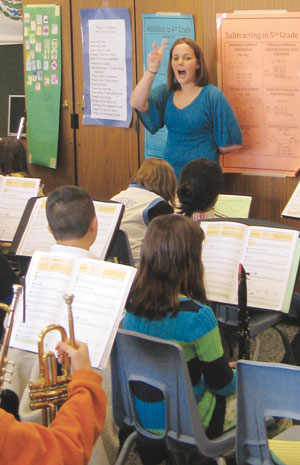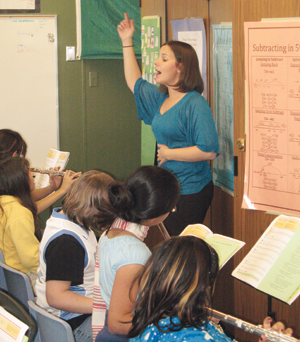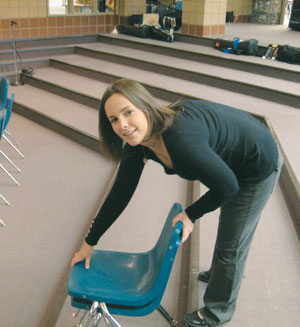 Many band directors travel between two or more schools. Juggling multiple schools can be difficult, even for experienced directors, and new teachers taking on multi-school positions could become overwhelmed or even burnt out within the first few years in the profession. Amy Mertz, Jason Missal, Andy Sturgeon, Matthew Tipton, and I each have faced jobs managing several schools at one time and have learned the tricks to making travelling between schools controlled rather than chaotic.
Many band directors travel between two or more schools. Juggling multiple schools can be difficult, even for experienced directors, and new teachers taking on multi-school positions could become overwhelmed or even burnt out within the first few years in the profession. Amy Mertz, Jason Missal, Andy Sturgeon, Matthew Tipton, and I each have faced jobs managing several schools at one time and have learned the tricks to making travelling between schools controlled rather than chaotic.
Be Accountable
With your responsibilities stretched across several schools, it may be difficult for people to keep track of you. Be sure that each school administrator, secretary, and other building music teachers have an up-to-date schedule of where you are and when. If a parent or colleague calls one school in search of you, it’s always better if a colleague can answer with a specific location and estimated return time rather than an ill-informed and confused-sounding comment. Mertz suggests, “If possible, establish a base school. It doesn’t necessarily have to be the one you’re at the most. The logical choice may the one that is most central to the other schools, but preferably it’s the one that has some office space for you.” Try to get a telephone extension and voicemail at your base school so you coworkers and parents can leave messages even when you are not there.
Plan Ahead

Abide by the calendar when planning out the year. If scheduled days off mean missing Monday classes two weeks in a row, be prepared in advance to make adjustments. Last-minute schedule changes to accommodate missed teaching days can make a poor impression on your coworkers. Similarly, be sure to double check each school’s calendar before scheduling performances. Rescheduling big events because of conflicts with school functions becomes extra tricky when there are obligations at other schools to consider.
As long as scheduling changes are presented as propositions and not demands and you give enough warning, teachers are likely to be agreeable. For example, at the last rehearsal before a concert, I learned that the 5th graders were going on a field trip. I proposed coming in the day before the concert to rehearse one more time, and the teachers seemed open to it. I’ve had great luck with that, but I have learned to be polite in making the request.
Pack Only Essentials
Traveling band directors have a great deal of instructional material to lug around. The more you consolidate, the more organized you will be, and the chance you will leave something somewhere gets much smaller. Find out what you can permanently and safely keep at each school so that you can lighten your daily load – especially when it comes to instruments. Consider breaking up your materials into day-by-day totes that you pack the day or night before. For example, if on Tuesdays you only teach woodwinds, it is unnecessary to bring brass books. If possible, keep records in just one grade book instead of many. Carry what you need to make your students’ music experience is as enriching as possible, but also keep in mind what is relevant. If you’re still struggling to lug everything you need, try recruiting student helpers with the permission of your school, of course. “Students love getting the responsibility of helping out the teacher,” says Sturgeon. “Do whatever you can to avoid burning yourself out by taking three trips to your car every morning.”
Items to bring every day include extra reeds and a mouthpiece puller because inevitably someone will get a mouthpiece stuck. I always like to have supplemental materials in case some students work through everything I assigned and are eager for more. I also like to keep fingering charts on hand if students aren’t keeping up. I sometimes bring recordings of the music we are working on so students can listen to the sound we are aiming for. I typically use my laptop to play music for students.
Make Every Minute Count
 Some schools may offer a reserved teaching space and others will not. Without a dedicated teaching space, Mertz suggests, “If at all possible, get to the school in time to set up the room before students come. It makes you seem like a more permanent fixture if you are not frantically setting up chairs and stands as they enter the room. This also makes it easy to handle students’ questions and problems before class. If a school offers you a permanent teaching space,” Missal says, “have an idea on the board after class is over for the next band day.” Ultimately, do whatever you can to create an atmosphere of continuity and consistency within your classroom.
Some schools may offer a reserved teaching space and others will not. Without a dedicated teaching space, Mertz suggests, “If at all possible, get to the school in time to set up the room before students come. It makes you seem like a more permanent fixture if you are not frantically setting up chairs and stands as they enter the room. This also makes it easy to handle students’ questions and problems before class. If a school offers you a permanent teaching space,” Missal says, “have an idea on the board after class is over for the next band day.” Ultimately, do whatever you can to create an atmosphere of continuity and consistency within your classroom.
Although I don’t have a dedicated teaching space at some of my schools, it is easy to find a quiet space before or after class to work on grading papers. I’ve also found the general music teachers at each school are often willing to share their space because they realize that your work adds to their music program as well.
At one of my current schools I can arrive 45 minutes early and take my time setting up. At another, a class ends at 1:40, and band starts in that room immediately afterward. It is a 5th grade classroom, and we have to move all the desks out of the way to accommodate 40 students. It’s hectic. Students help out a lot, and classroom teachers encourage this. Students understand the sense or urgency in setting up a classroom in five minutes. There is no time to waste.
Get to Know the Other Teachers
The smile you send a colleague in the hallway one morning might be the only time he sees you all week. Because of this, it is especially important to make good choices with everyday projects and problems. Choose your battles wisely, and do your best to create a lasting impression at each school. Everyone should feel that you are a positive, effective music educator who is an active and considerate member of the school community.
Whenever possible, have lunch with other teachers. Although it’s tempting to use free time to sit in solitude, sharing lunchtime with the teachers in the building can make you feel more a part of the faculty. Eating with your coworkers provides opportunities to discover more about your students through conversations with their classroom teachers, and it can help keep you up-to-speed on information that you might have missed. “Getting to know the other teachers has been key for me, especially because I have to take students out of classes for lessons,” says Sturgeon. “The teachers are happy to let their students go to band because they know and like me.” Befriending your students’ classroom teachers can also be crucial to finding out such information as testing schedules, field trip dates, assemblies, and other events that might conflict with your teaching schedule.
Hopping from school to school can sometimes feel a little lonely, but there are innumerable opportunities to meet people beyond your normal teaching responsibilities. Although it is important to avoid overcommitting to extracurricular activities, coworkers and students will remember seeing you outside the band room. Attending an ice cream social or a parent-teacher conference shows others you are committed to your students outside of the music classroom and helps you feel more a part of each school. Tipton suggests, “Volunteer for bus duty. You have to travel between schools, but that does not make you the exception to the school community. If the other teachers see you as part of the school, they promote your program, they watch out for you, and they are more likely to be flexible with their schedules to help you out when you need it.”
Follow Up on Missed Meetings

If your schedule makes it impossible to attend faculty meetings, be sure to follow up on the topics that were discussed, because they could be important to the band program. Although your administration should understand that responsibilities at other schools may keep you from these meetings, they are unlikely to be understanding if you miss a memo regarding something important. For example, I was unable to go to the faculty meetings at one school I started teaching at this year, and no one told me when grades were due until one week before the due date. Find a way to get copies of the minutes or get notes from somebody. You don’t want to be the last person to know about field trips or new policies, especially if a school is making changes that affect the music program.
Be Flexible
Each school and each student is different. “Forge a rapport with the students at each school,” encourages Missal. “Don’t be afraid to try different methods at different schools. Also, avoid comparing students from different schools. Try to keep students of the same grade level around the same point in the curriculum, but let each class bloom at its own pace.”
Students at different schools are likely to progress at different rates. If the weekly rehearsal schedule was shortened because of a holiday or field trip, I might borrow a day from a faster-moving school and schedule an extra a full band rehearsal. I feel comfortable borrowing time from other schools, especially if we are working toward common goals or even common concerts.
If the goal for all schools is to be on page 15 of the method book by the time of the concert, advanced students can simply work on additional materials. If two groups at different levels are sharing a concert, I might have three standard pieces that students from both schools are going to play and a piece from each school that is more suited to their level. Students sound good when the music is chosen carefully, and the audience never notices any difference in skill level.
Set the Rules
“Be consistent with discipline across schools,” says Missal. It is also important to know the fine pints of each school’s rules and policies. Don’t send a student with a discipline problem to the principal if the dean is supposed to handle it. Not only will that frustrate your administration, it will make you look uninformed.
I keep my rules consistent in all schools as much as possible. In one of my schools students call their teachers by their first name, but I require them to call me Miss Martin. Some students get frustrated that I do not permit hats in band although they are allowed to wear hats in school. I keep my standards the same in order to preserve my integrity and expectations as a teacher. I thrive on consistency, and it is hard for me to change gears and expectations when I am going from one school to another frequently. This also saves headaches when students from more than one school are together – such as at a dress rehearsal for a joint concert.
Joint Concerts
Combining concerts can be an efficient way to have concerts. It is important to plan ahead, even on such details as knowing that you can get into the school on the day of the concert. Frequently teachers who travel between schools are overlooked when it is time to give out keys. I had this happen when it did not occur to me that the school would be locked at 7 p.m.; it got a little tricky. Another detail to consider is location. Parents appreciate it when you combine schools in a geographically friendly way, but if a winter concert is at one school, consider holding the spring concert at the other.
Combining a concert is also beneficial for students to hear what others are doing. Depending on how big the groups are at each school, it can enhance the whole band experience. A beginning band might be lacking in numbers but have the opportunity to fill out the section by playing with students from another school. All my students love full band more than small groups and sectionals.
At the beginning of the year when students sign their behavior contracts and music contracts, I make sure that I get parent telephone numbers and e-mail addresses. Sometimes part-time employees of a particular school have to work to get that information, so I find it easiest to collect it on my own. I have had good luck sharing information and updates by e-mail. I do send notices home but these often end up in the wad at the bottom of somebody’s backpack. If concert dates are set by the beginning of the year and the calendar is part of the behavior contract, then parents have the information in plenty of time.
Band directors have a seemingly overwhelming amount of responsibility, and these responsibilities become compounded when teaching at multiple schools. Learning to efficiently navigate the ins and outs of school dynamics makes it easiest for teachers to spend the bulk of their energy in the place it counts the most – the classroom.
Amy Mertz, currently at Syracuse University, taught beginning band in three elementary schools in Massachusetts during her first job.
Jason Missal, currently at the University of Colorado, taught band at a high school, middle school, and two elementary schools in Jenks, Oklahoma.
Andy Sturgeon currently teaches band at four elementary schools and one junior high school in Evergreen Park, Illinois.
Matthew Tipton, currently teaching at Washington Middle School in Missoula, Montana, taught band at three schools while working at his first job in Quincy, Illinois.






